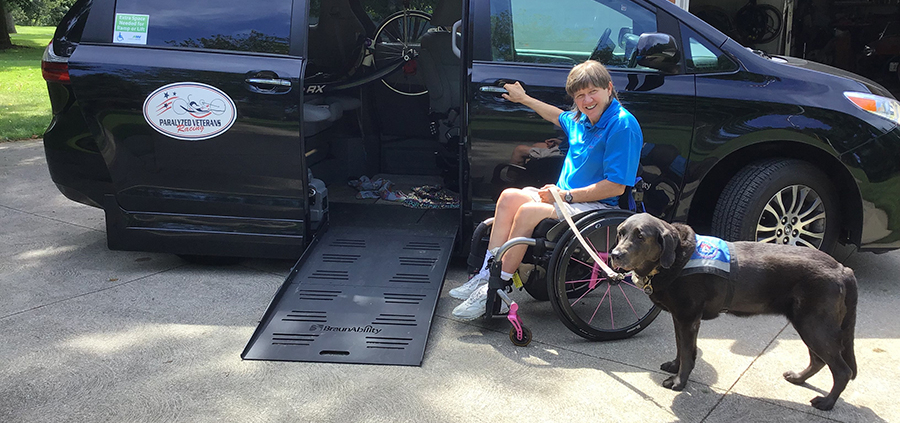Mobility My Way: If it’s a Wednesday…

By Mike Savicki
Holly Koester’s road to automotive mobility takes her (almost) everywhere (almost) every day.
There are those who keep a busy calendar and there is Holly Koester. If you do one thing every Wednesday of the month, she does four different things depending on which week it is. Ditto for Mondays, Tuesdays, Thursdays, and Fridays. And if you look forward to the weekend as a time to rest, relax, and unwind, Holly looks at it as a time to get even more active; she competes at wheelchair and handcycle races anywhere, and everywhere, around the country or stays local and handcycles along many of the paths and bikeways near her suburban Cleveland home.
Here’s how she fills her week. At last count, Holly is a member of two quilting clubs, two dog clubs, and a church group or two. She has been a K – 8 substitute teacher for 25 years and, as of late, she’s the newly elected president of the Paralyzed Veterans of America’s Buckeye Chapter. She has completed a wheelchair marathon in all 50 states and is now doing it all over again, this time with her sister, Joy, who is competing alongside in half marathons.
Being active and including mobility in her life comes naturally for Holly. Following her August 1990 spinal cord injury, Holly added hand controls and a bike rack to the convertible Mustang she had recently purchased. Along with another wheelchair-using disabled veteran friend, she figured out a way to load two wheelchairs and, sometimes, a racing wheelchair, too, for daily workouts. But it was complicated, time consuming, and unsustainable.
“We had quite the system in place, but it was my mom,” Holly shares, “who watched me lift wheelchairs in and out over and over again, told me I was going to mess up my shoulders, and suggested I get a van.”
So she eventually made the switch. Her first van was a “sharp and spacious on the inside” 1991 Ford Econolline which “I really liked but it was so hard to find a parking spot and operate that lift when cars parked too close.” Two years later she purchased a Ford minivan and, not yet fully knowing about conversion companies, oversaw the modifications herself, a process that took months. She has stuck with the same type of vehicle in the years since working with M.C. Mobility Systems and MobilityWorks.
Buying a minivan that keeps up with Holly’s lifestyle demands is no easy task.
“Vans and adaptive equipment change so much that before I get a van I make sure both my racing chair and my handcycle fit,” she explains. “It’s a whole ordeal when I come in to check out new ones,” Holly explains. “I bring my handcycle and racing chair and they work with me to make sure it all fits and there’s still room for Glory.” (Glory is her faithful service dog.)
With her newer vans, she appreciates even an extra foot or two of inside space.
“Being able to turn a full circle inside is so valuable when you are loading and unloading and using the van as much as I do,” Holly says. “There’s also the extra benefit of being able to load up family, others in chairs, friends from the chapter, and take them out. I love it because my van promotes independence.”
However, vehicles have issues and when they break down or require maintenance, Holly feels most vulnerable.
She offers, “As great as it is to drive, not being able to drive is the worst feeling. You feel like your freedom and independence, everything you’ve worked for, is just stripped away. You need someone to go with you, it puts a burden on them to do the loading and unloading, and your other option is to just stay stuck at home.”
Preventive maintenance helps, too. She has found success (and peace of mind) by following recommended service schedules, getting tires rotated, oil changed, and adaptive equipment serviced while also visiting her local dealership for safety checks before hitting the road for travel to races. They know her by name and when she’s about to hit the road. “I really like driving and everything that comes with getting all geared up for it. Food, drinks, CD books, and all my gear and equipment, whether it is travel from one side of Cleveland to the other or somewhere else,” she concludes. “Knowing I’m able to go wherever I want whenever I want, and not being dependent on someone else for my mobility, especially with the schedule I keep, is the best feeling by far.”
Mike Savicki’s “Mobility My Way” is a column which appears quarterly in NMEDA’s Circuit Breaker magazine.
